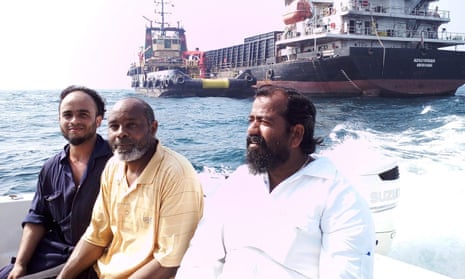After 18 months stranded on a cargo vessel miles off the coast of the United Arab Emirates, with little food or water, no wages and little means of communication, Captain Ayyappan Swaminathan’s ordeal is finally over.
In April, the Guardian reported the story of Ayyappan and his 10-strong crew, one of the most extreme cases of seafarer abandonment in recent years.
On Sunday night, Ayyappan said his “cup is overflowing” with happiness after an emotional reunion with the family he hasn’t seen since he left India, in January 2017. Speaking from his home in Kumbakonam, with his wife, Menaka and daughter, Aniya, who turned seven last week, Ayyappan said: “I cannot describe what it felt like to hold my daughter again after so many days and nights. I’m really happy. She is also very happy.”
He last saw Aniya when she was four years old.

It marks the end of a long, drawn-out case where the captain and crew were abandoned by the vessel owner, Elite Way Marine Services, unable to leave the ship fearing the loss of their claim to thousands of dollars in unpaid wages.
Ayyappan sent the Guardian a video that recorded the emotional moment he finally left his ship, MV Azraqmoiah, shot from a speedboat carrying him safely to shore.
“When I touched land, I felt like flying – oh my God,” said the merchant seaman of 20 years. “This is the day we dreamed of. My cup is overflowing again and again.”
Ayyappan, who thanked everyone who helped him, said he had now been paid 80% of the $84,000 (£66,000) salary owed to him.
His two colleagues, Rajib Ali, a cook from India, and Ibrahim Adam Iazim, chief officer from Sudan, were also repatriated. Other members of the crew, who accepted 40-60% of their owed salaries, left the ship in April.
The seafarers endured terrible hardship aboard, as their supplies dwindled and finally ran out, prompting them to seek help to survive. Ali’s father passed away in August 2018, yet still they waited for the wages. There were days when a lack of fuel left the vessel in darkness in the busy shipping lane, endangering the crew and other ships. The Indian consulate and the charity Mission to Seafarers were able to help by providing food and water.
In all, 36 sailors in at least seven vessels were abandoned by Elite Way Marine Services, according to the Federal Transport Authority (FTA) in the UAE. The case was first highlighted by the International Transport Workers’ Federation (ITF).
UAE-owned Elite Way Marine Services told the Guardian in April that they failed to pay the seafarers from Azraqmoiah and other ships after encountering financial problems, but promised they would be paid soon. Captain Ibrahim Gafar, Elite Way’s operations manager, said the company had previously been unwilling to sell any of its vessels to release money for wage payments because unfavourable market conditions meant he would not get a good price, but they later found a buyer for one while another was being sold for scrap. “We have a financial problem,” said Gafar at the time. “For one and a half years the market has been down. Any person would not give a good price for the vessel.”
The company could not be contacted for this article.
It has since emerged that the international attention brought by the Guardian’s coverage in April and May helped to pressurise the owners to act.
In February, Mission to Seafarers and the FTA took legal action against the vessel’s owner over the unpaid salaries. The first ship was arrested under maritime law in April, followed by other vessels, including the Azraqmoiah, which was sold to pay the seafarers’ salaries. The FTA has banned the company from operating in UAE waters.
Jasamin Fichte, of the law firm Fichte & Co, said the vessel’s owner had “made a mockery” of the UAE legal system. She vowed to lobby for better regulations.
Fichte said: “It’s obvious to everyone involved the ship owner has to pay their wages. If it hadn’t been for our actions, the crew would not have been paid at all. But the vessel owner got away with paying less. He has made a mockery of the legal system here.”
The conditions on the ship were “horrible”, she added.
“Such actions would be considered criminal in many jurisdictions. Seafarers were suffering from physical and psychological conditions. We were worried for their safety. No food, no water, no air conditioning in 40 degree heat – it’s not something I would wish on anybody.”
Fichte said she will meet with the UAE government to talk about how they can stop the rising problem of vessel owners abandoning crew in their waters. A law to seize abandoned ships is already under discussion in the country.
Rev Andy Bowerman, the Middle East and south-east Asia director of Mission to Seafarers, praised Ayyappan for helping to highlight the “unacceptable” issue of abandonment at sea.
“He realised that if he held out for longer, he would highlight the issue – and there is a bigger issue here,” said Bowerman. “At some point the UAE has got to change its approach to seafarers.”
He urged the UAE to sign up to an amendment to the maritime labour convention, which guarantees better protection for seafarers by requiring ships to carry insurance to pay them if they are abandoned.
Worldwide, 4,866 seafarers on a total of 336 vessels have been abandoned on board ship since 2004, according to a database by the International Maritime Organization and the International Labour Organization.
“The flag states should do more,” said Mohamed Arracedi, the ITF’s coordinator for the Arab world and Iran, who has dealt with over 100 cases of abandonment and recovered $1.26m in owed wages in 2018. “Many of the cases we are dealing with in the Emirates are severe abandonment cases. Why do owners abandon their ships in the UAE? A little bit of speculation, it is probably a lack of regulation. They know if they abandon ships in Spain, the port states can intervene and the maritime labour convention is applied. These things can be solved quicker.”
